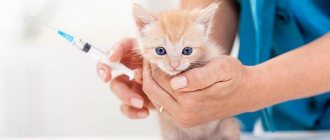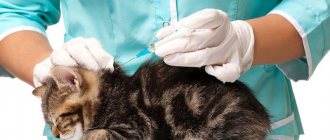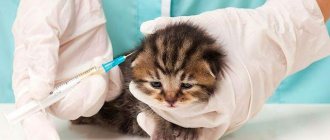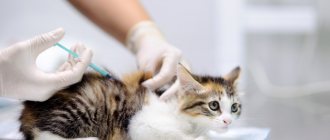Vaccination of kittens is a subject of debate for many breeders and lovers of these amazing animals. Some people are concerned about the consequences of vaccination, while others are afraid that their pet will feel unwell after the injection. Such fears are unfounded. Despite the fact that vaccinations can cause the development of temporary illness in kittens, the benefits from them will be several times greater. Experts insist on the need to introduce vaccines into the body of kittens and adult cats, since this is what will prevent complex infections in them and even save lives.
Should a kitten be vaccinated: pros and cons of vaccination
Many kitten breeders are convinced that if their pet lives in an apartment or private house, does not go outside and does not have contact with other animals, then there is no need to vaccinate. Is it really? It is important to understand that not only a street kitten, but also a domestic kitten can become infected with infectious diseases. This can happen under the following circumstances:
- through objects brought in from the street, human shoes, which may contain pathogenic microorganisms;
- owner's dirty hands;
- grass that a person will bring to a kitten from the street;
- in the veterinary clinic during the examination.
There are many risks of kittens contracting dangerous diseases, so it is better to prevent them in a timely manner. Among the positive aspects of vaccination are:
- creating a reliable immune response in the kitten’s body;
- the ability to freely take your pet outside the country;
- a necessary condition for participation in exhibitions;
- compliance with the rules of breeding purebred cats;
- protection of the offspring of vaccinated kittens in the first months after birth;
- the opportunity to let the kitten outside, walk with it in the park, at the dacha.
What are the disadvantages of vaccination? These include unnecessary financial expenses and the likelihood of your pet developing post-vaccination complications.
How to vaccinate yourself
When can you walk your puppy after the second vaccination?
Before vaccination, you must carefully study the instructions. It will indicate how the vaccine will be administered. For example, subcutaneous injections are placed at the withers. The rabies vaccine is injected either into the withers or into the muscle. In both cases you need to prepare:
- cotton pads (or just cotton wool);
- several sterile syringes (2 cubes or less). Insulin syringes are suitable;
- vaccine (if necessary, solvent for it);
- antihistamines (in case of allergic reactions). Suprastin must be available.
Injection into the withers:
- Calm the animal and pick it up.
- Draw the drug into the syringe. If the vaccine has two fractions, then first you need to inject the solvent into the vaccine vial with a sterile syringe and shake it.
- Wipe the area where the injection will be given with alcohol. Do it carefully and calmly so that the cat does not become nervous.
- Place the animal on all four paws. Take it by the withers and pull it up a little. The tension forms a notch, and you need to inject it into it. With a quick, confident movement, insert the needle into the subcutaneous tissue to a depth of 1.5 cm. The syringe should be parallel to the cat’s body. The drug should be administered at an average speed (do not hesitate), without sudden movements.
- Carefully remove the needle and release the animal.
How to vaccinate yourself
Into muscle:
- Place the cat on its side. Feel the muscle on the thigh (lower part) (the animal’s paw should be extended).
- The vaccine must be administered in a vertical, perpendicular position. Do it quickly and confidently. The needle should be inserted halfway (maybe a little deeper) into the densest place. If you overdo it, you can damage the sciatic nerve.
- Remove the syringe, stretch the muscle and release the pet.
What vaccinations should indoor and outdoor cats have?
Veterinarians advise both indoor and outdoor kittens to be given a number of vaccines; they will protect against most known diseases. Some of them must be done, others can be done at will. Study carefully and decide which vaccinations your pet needs.
Table 1. Vaccinations for adult cats and kittens
| Disease | Necessity | Symptoms of diseases | Methods of infection |
| Panleukopenia (parvivirus enteritis, plague) | Mandatory | A contagious viral disease with a severe course, which is often fatal. The pathological process is characterized by a sharp decrease in leukocytes in the blood and a critical deterioration in the condition of the immune system. | An animal can become infected everywhere, picking up the infection on the street or in the home, where it was brought along with shoes or on clothes. |
| Rhinotracheitis | Mandatory | A disease of viral etiology that affects the mucous membranes of the respiratory organs, characterized by a high mortality rate. | Airborne, contact |
| Calicivirus | Mandatory | Damage to the respiratory system, eyes and nasal passages. Leads to the development of lameness. | Airborne, household |
| Rabies | Only for animals traveling abroad | A gross disruption of the functionality of the nervous system, which in 100% of clinical cases ends in the death of the animal. | Through the saliva of an infected animal, during a bite. |
| Viral feline leukemia | Recommended | Marked decrease in immune function with disruption of the formation of all blood cells, development of malignant tumors of the lymphatic sphere and bone marrow | Intrauterine infection, through saliva, through sexual contact. |
| Chlamydia | For mating and breeding cats | Damage to the genital organs and intestines, as well as conjunctivitis and inflammation of the nasal mucosa | Through direct contact with an infected animal. |
| Infectious peritonitis | Recommended | Infection of the small intestine and peritoneum with the development of symptoms of inflammation | Fecal-oral route |
| Microsporia | Recommended | The appearance of pathological formations on the skin, which are accompanied by itching, peeling, hair loss and damage to the structure of the claws | Contact and household transmission route |
| Feline AIDS | If you stay only at home, infection is unlikely. Walking freely on the street is a must! | Suppression of natural immunity with the formation of its deficiency | Oral route through ingestion of contaminated meat |
Other complications after Covid
What other complications can arise after Covid? In addition to the respiratory system, the virus affects the heart, blood vessels and central nervous system, especially on those who have suffered a severe illness. Those who have had a mild form of the disease may experience depression, weakness, and loss of smell.
Often, patients who have recovered from COVID-19 seek help from a neurologist and psychiatrist to get rid of anxiety, panic attacks, and acute insomnia. This is due to the effect of the virus on the central nervous system. Such consequences of coronavirus can last for several months.
According to pulmonologist Alexander Palman, associate professor of the Department of Therapy of the First Moscow State Medical University named after. Sechenov
, tragic and fatal complications occur in those who have suffered a severe form of the disease with lung damage up to 70–80%. Severe complications can occur in two scenarios:
- The direct effect of the virus on a particular organ or tissue;
- The body's defense response to infection, which doctors call a cytokine storm. This reaction causes severe inflammation that damages organs.
Therefore, when treating seriously ill patients, hormonal agents that suppress the cytokine storm are used. To avoid thrombotic complications, the treatment regimen includes anticoagulants, since thrombosis with coronavirus is a common occurrence, and they can easily provoke a stroke.
The virus can have a direct effect even on the musculoskeletal system, and this does not arise from the fact that a person lies ill for a long time. According to doctors, this infection should not be underestimated, because it can affect organs completely unexpectedly and in a wide range.
When to get your first vaccination
The first vaccination for small kittens is given at the age of two months. This is the optimal period when maternal immunity ceases to operate and the little tomboy’s body is already strong enough to form vaccine protection. It is not advisable to vaccinate a kitten yourself. This should be done by a specialist. After the injection, information about the date of vaccination, type of vaccine, series and dose will have to be entered into the animal’s special vaccination certificate.
The first immunization allows you to inoculate the kitten with immunity against several infections, in particular, calicivirus, parvovirus enteritis or canine distemper, and rhinotracheitis. He needs a second injection of the vaccine, which is carried out 7 and 21 days after the initial injection.
Key requirements for immunization
When immunizing a kitten, you should follow some rules:
- the drug can only be administered to a completely healthy pet;
- Injections are prohibited for a kitten after communicating with infected relatives;
- after immunization, surgical intervention is contraindicated for 21-25 days;
- after surgery, vaccination is not carried out for at least 21 days;
- if antibiotics are used for therapy, administration of the medication is allowed after 2 weeks;
- It is forbidden to vaccinate your pet when changing teeth;
- the vaccine should not be expired;
- It is contraindicated to vaccinate pets under 2 months of age;
- During the procedure, the baby must be calm.
Rabies vaccination: when to do?
Rabies is one of the most dangerous diseases, the pathogens of which can affect the body of most animals, as well as humans. This is a deadly infection that does not give living creatures a chance to survive. The only protection against a fatal outcome is timely prevention of pathology, that is, vaccination against rabies.
Read. First vaccination for Labrador puppies: at what age do they do it?
The rabies vaccine is one of the rather aggressive immune preparations. In the first days after the injection, vaccinated animals may feel general discomfort, their appetite worsens, and malaise appears. If your pet has such symptoms, then this is not a reason for concern, since after a couple of days they disappear without a trace, leaving no consequences. If you see that your pet continues to be lethargic, you need to consult a doctor.
Vaccination to prevent the disease is carried out for growing kittens who have reached 3 months of age, as well as for adult cats. It is recommended to administer the vaccine annually (some rabies vaccinations allow you to develop immunity for three years).
Mr. Cat recommends: Types of vaccines
There are four types of vaccines, which determine the duration of the vaccination and the range of effects on the body.
Depending on the impact, they are distinguished: monovalent and polyvalent. They are distinguished from each other by the degree of impact, protection from one specific disease or complex protection from two or more pathologies.
There are also active and inactive vaccines. They are divided by duration of action. The former contain live but weakened strains of bacteria and viruses, while the latter contain “dead” strains. Vaccinations with non-living pathogens will have a short duration of action.
Self-selection of a vaccine is not recommended. Only an experienced veterinarian can choose the drug that is most suitable for your pet.
How to prepare an animal for vaccination?
Before vaccination, kittens need special training. It includes several important points:
- deworming – expulsion of worms;
- prevention of parasitic infections;
- examination of the animal immediately before administration of the drug.
Kittens are dewormed one and a half weeks before the first vaccination. To do this, it is better to use anthelmintic drugs in tablet form or in the form of syrup, in particular, Febtal, Dirofen, Prazitel, Panacur, Pirantel. Getting rid of intestinal parasites promotes better absorption of the vaccine and the development of lasting immunity. Before revaccination, deworming will not be necessary. It is recommended that adult pets undergo deworming one and a half weeks before each vaccination.
As you know, fleas and ticks greatly weaken the immune system of animals. Therefore, before vaccination, prevention of such diseases should be carried out so that the body has the opportunity to develop adequate reactivity to infectious diseases.
An important part of preparing for immunization is examining your pet immediately before the injection. Such an event is carried out by a qualified specialist, he assesses the general health of his patient, measures his body temperature, makes sure that the kitten does not have pathological discharge from the nose, eyes, etc.
Possible consequences after vaccination
After immunization, some unpleasant consequences are possible:
- lethargy;
- lack of appetite;
- elevated temperature;
- pain at the injection site;
- encephalitis;
- polyneuritis;
- arthritis;
- convulsive conditions;
- changes in behavior;
- loss or change in hair color in the area where the medication was administered.
Increased sensitivity to the vaccine and immune reaction may manifest itself as:
- inability to develop immunity after injection;
- tumors at the injection site;
- reactions caused by incorrect or untimely vaccination.
Vaccination schedule: what vaccinations are given and when?
Representatives of the cat family have their own vaccination schedule, according to which veterinarians advise vaccinating them. The first vaccination is administered to a kitten at the age of 2 months and provides the animal with the formation of comprehensive immune protection against panleukopenia (distemper), calicivirosis, and rhinotracheitis. He needs a two-time revaccination, which is done a week and a month after the first injection.
You should definitely vaccinate your kitten against rabies. Modern vaccinations allow this to be done together with the third complex revaccination or independently when the kitten reaches three months of age. The vaccination schedule for adult felines is as follows. A comprehensive rabies vaccination and injection is administered once a year, annually. Table3. Vaccinations by age
The most famous brands of vaccinations
| VACCINE | INFECTIONS |
| Nobivac Tricat | viral rhinotracheitis, calicivirus, panleukopenia |
| NobivacRabies | rabies |
| Multifel | viral rhinotracheitis, calicivirus, panleukopenia, chlamydia |
| Vakderm | microsporia, trichophytosis |
| Eurifel | feline viral leukemia, viral rhinotracheitis, calicivirus, panleukopenia |
| Felovax | viral rhinotracheitis, calicivirus, panleukopenia, chlamydia |
| Microderm | microsporia, trichophytosis |
| Felocell | panleukopenia, calicivirosis, viral rhinotracheitis, chlamydia |
| Feligen | panleukopenia, calicivirus infection, viral rhinotracheitis and rabies |
| Chlamikon | chlamydia |
| Rabizin | rabies |
| Quadricate | rabies, panleukopenia, calicivirosis, rhinotracheitis |
| Purevax | panleukopenia, calicivirosis, rhinotracheitis, chlamydia |
Where can you get vaccinated?
Currently, almost every private and public veterinary clinic provides kitten vaccination services. But who is better to trust? Most kitten breeders prefer private specialists, and there are good reasons for this.
It is believed that paid offices are cleaner. Although such a judgment is subjective. In addition, private veterinarians purchase more expensive vaccine preparations, devote more time to preliminary examination of the furry patient, as well as advice regarding the post-vaccination period and care of the kitten. If you have the financial opportunity, it is better to do it for a fee.
The most responsible cat owners prefer to vaccinate their pets at home. To do this, they call a doctor at home. Indeed, this method of vaccination is the safest; the pet is protected from contact with sick animals and is not exposed to the stressful situation associated with traveling in transport. The only negative is that such a technique will require considerable material investment.
Read. Vaccinations and vaccination of cats against lichen
Vaccinations for cats by age: table
Table 1. Vaccination of cats, vaccination schedule
| Name of the disease | Primary vaccination | Revaccination | Subsequent revaccination | Type of injection | |
| First injection | Second injection | ||||
| Rabies | 12-13 weeks | — | At 1 year | Every year | subcutaneous |
| Panleukopenia | 8-12 weeks | In 21-28 days | At 1 year | Every year | subcutaneous |
| Rhinotracheitis | 8-12 weeks | In 21-28 days | At 1 year | Every year | subcutaneous |
| Calcivirosis | 8-12 weeks | In 21-28 days | At 1 year | Every year | subcutaneous |
| Chlamydia | 8-12 weeks | In 21-28 days | At 1 year | Every year | subcutaneous |
| Trichophytosis | 1-6 months | In 10-14 days | At 1 year | Every year | intramuscular |
| Microsporia | 1-6 months | In 10-14 days | At 1 year | Every year | intramuscular |
Are there any complications or side effects?
If you follow the instructions and use high-quality drugs, the occurrence of side effects after vaccination is reduced to a minimum (up to 1%). The most common complications are:
- allergy to the components that make up the drug. If there is salivation, difficulty breathing, involuntary defecation, or inappropriate behavioral reactions after vaccination, the animal will most likely need the help of a veterinarian. If over the next 20 minutes. the condition has not stabilized, it is necessary to urgently contact a veterinary clinic;
- when vaccinating an already infected pet (when symptoms have not yet appeared). This happens extremely rarely and can complicate the disease, even leading to death. Before the procedure, you must observe a 2-week quarantine, and also contact a veterinarian for a full examination of the animal;
- redness or a small bump at the injection site. This is a completely normal phenomenon, and owners should not worry about it. After a couple of days, the visible consequences of the injection will disappear without a trace.
Vaccination is an effective and inexpensive method of preventing diseases that are dangerous for cats. Timely vaccination will not only keep your pet healthy, but will also save you from expensive treatment in case of infection.
General information about the vaccine
JSC Medicine uses the Russian-made drug Gam-COVID-Vac, better known under the commercial name Sputnik V. The vaccine was developed and produced by the National Center of Epidemiology. N. Gamaleya. This is a two-component vector-type drug, the production technology of which is well known and has been tested many times over the past decade. The basis is two types of harmless human adenovirus, the shells of which are supplemented with protein particles of the S-protein of the SARS-CoV-2 coronavirus. When the drug enters the human body, it causes an immune response, which consists of producing a sufficient amount of specific antibodies and forming stable immunity to COVID-19 infection.
What are the dangers of vaccination against coronavirus?
One of the most frequently asked questions by our patients is: what are the dangers of vaccination against the SARS-CoV-2 coronavirus? For healthy people without contraindications, the possibility of unwanted side effects, judging by the test results, is extremely small. The likelihood of developing dangerous consequences increases for several categories of patients.
- Those who have been ill. If the body contains large quantities of IgG antibodies to the S-protein of the virus, then a person may develop a cytokine storm - a dangerous condition characterized by the rapid development of an inflammatory process, which can even lead to death. At the same time, the lack of antibodies does not create the necessary protection against re-infection. Therefore, people who have had an infection, even in a mild form, should do an IgG antibody test before vaccination.
- People with medical contraindications. In some cases, the ban on immunization is temporary. So, if you get sick with ARVI, then after recovery you need to wait two weeks, after which you can get vaccinated. If you have a severe allergy, it is impossible to predict how the immune system will react to the components of the vaccine, so you should refrain from vaccination.
- People with chronic diseases. If the disease is not currently aggravated, then the possibility of vaccination should be discussed with your doctor to avoid the risks of worsening the condition.
But even in the absence of contraindications, after the vaccine is administered, certain consequences of vaccination against coronavirus may appear. Some people experience a slight increase in temperature, chills, headache, muscle aches, and the injection site remains painful for one to two days. These unpleasant sensations usually disappear on their own. If these symptoms do not go away after three days, you should call your doctor. For temperatures above 39°C that do not go away for more than six hours, you must call an ambulance. Under the supervision of highly qualified specialists of Meditsina JSC, you do not have to worry about your health. Find out more on the services page.









